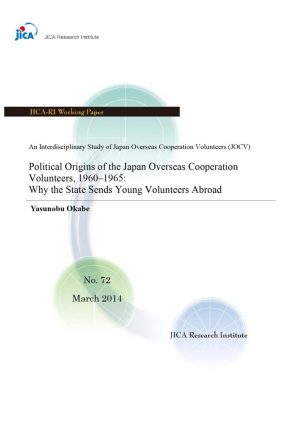Political Origins of the Japan Overseas Cooperation Volunteers, 1960–1965 Why the State Sends Young Volunteers Abroad
This paper examines the political origins of the Japan Overseas Cooperation Volunteers (JOCV) through the lens of two research questions: (1) Why did the Japanese government undertake the JOCV project in 1965? and (2) Why did the project pursue multifaceted objectives – technical assistance, international friendship, and youth development? These questions are important for two reasons. First, as the country was struggling economically, experiencing domestic turmoil, and vulnerable to international conflict, it is surprising that the government would begin sending young volunteers to developing countries. Second, the JOCV’s objectives are inconsistent with each other, and therefore their coexistence requires further examination. Using a multi-level analysis strategy, we explore international and domestic factors. The analysis of international structures focused on the Japan-US relationship and the Cold War in Asia, and proved that two factors motivated the Japanese government to create the JOCV: Prime Minister Ikeda’s desire to approach economic development in Southeast Asia; and the US government’s demand that Japan take some action regarding the US goal of expanding the idea of the Peace Corps. Our inquiry into the domestic structures focused on youth problems such as unemployment in rural areas, the anti-Security Treaty movement, and rising crime in cities. We have discussed that leaders of youth associations and young members of the governing Liberal Democratic Party (LDP) considered overseas voluntary service like the Kennedy’s Peace Corps as a potential solution to these problems. The analysis of agential factors sheds lights on the policy-making. There was disagreement between actors over the definition of the new project. While a coalition of youth associations and young members of the LDP advocated an overseas voluntary service project, the Ministry of Foreign Affairs (MOFA) insisted on dispatching experts rather than volunteers. Eventually, the two sides reached a compromise: the JOCV would be defined as a project providing both technical assistance and youth volunteers; and it should be managed under the supervision of MOFA. Finally, this study demonstrates that when the state sends young volunteers abroad, external ideas and political actors’ concern for youth development matter. It also implies that state-sponsored volunteering can be defined as a hybrid of the state project and individual activities, which neither realism nor constructivism in international politics can solely explain.
